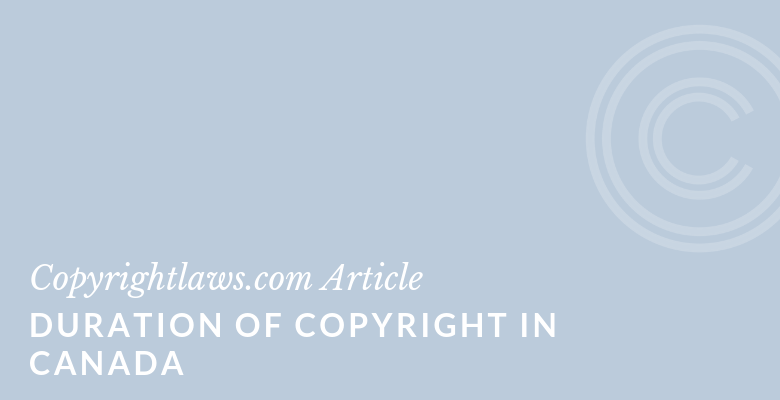
The duration of copyright in Canada is 70 years after the death of the author. There are several exceptions to this general rule of duration in Canadian copyright law, some of which are set out below.
Canada's copyright duration was previously 50 years after the death of the author but was extended to 70 years after the death of the author in keeping with requirements of the Canada-United States-Mexico Agreement (CUSMA, known as USMCA in the U.S.). See below for further information.
The Duration of Copyright in Canada
Unlike physical property, ownership in copyright material has a limited duration. So for example, you can own a work of art for an indefinite amount of time, but you can only own the intellectual property or copyright in a painting or photograph for a limited period of time as stipulated in the Canadian Copyright Act.
The Canadian Copyright Act provides the general rule for the length of copyright protection for published works as:
the life of the author, the remainder of the calendar year in which the author dies, and a period of seventy years following the end of that calendar year.
This is often referred to as "life-plus-seventy." Under this rule, an author has copyright in a work they create throughout their lifetime. Their heirs or assignees have copyright for a period of 70 years after the author's death.
The copyright will expire at the calendar year end of the seventieth year from the death of the author.
However, if copyright in a work expired after the original duration of life-plus-fifty before 30 December 2022, it remains in the public domain. For example, if an author died on 1 June 1970, copyright in their works expired on 31 December 2020. Under the new law, if an author died on 1 June 1973, copyright in their works will expire on 31 December 2043. Copyright in all of that author's works will expire at the same time unless they're subject to an exception to the general rule of copyright as discussed further below.
Duration Determined by Author's Life
Under Canadian copyright law, duration is determined by the life of the author, not by the life of the owner of copyright. Where an author sells their copyright and assigns the rights in their work to another person or entity, the duration of copyright is still calculated based on the life of the author. Even where works are made during the course of employment, copyright is determined based on the life of the author.
For further information on Canadian Copyright law, see 8 Facts About Canadian Copyright Law.
There are exceptions to the above general rule of life-plus-seventy. One exception is that Crown or government works in Canada are protected until published and for an additional fifty years from the date of publication.
IMPACT OF THE CUSMA (USMCA) ON COPYRIGHT DURATION
On 30 September 2018, Canada, the United States and Mexico completed negotiations on a new trade agreement, the United States-Mexico-Canada Agreement (USMCA) to replace the North American Free Trade Agreement (NAFTA). You can read the text of the agreement here. Under the USMCA, the minimum duration of copyright protection in the U.S., Mexico and Canada is life-plus-seventy.
Bill C-100, An Act to implement the Agreement between Canada, the United States of America and the United Mexican States was introduced into the Canadian Parliament on 29 May 2019. The bill entered into force on 1 July 2020.
Beginning on 30 December 2022, copyright duration in Canada was extended to life-plus-seventy.
Note that the government of Canada refers to the USMCA as the Canada-United States-Mexico Agreement (CUSMA). The agreement is also referred to as "the new NAFTA."
Canadian Government Public Consultations on Extending the Duration of Copyright Protection in Canada
On 11 February 2021, the Canadian government announced its public consultations on extending the duration of copyright in Canada from life-plus-fifty to life-plus-seventy. It also published a consultation paper on copyright duration in Canada, related issues and copyright duration in the U.S. and EU countries.
In its backgrounder, the government stated:
Under the Canada-United States-Mexico Agreement (CUSMA), which entered into force on July 1, 2020, Canada committed to extend its general term from 50 years after the life of the author to 70 years after the life of the author. Canada has a transition period that lasts until December 31, 2022 to implement this change.
A longer general term of protection will increase opportunities for Canadian rights holders to monetize copyright-protected content, thereby encouraging investment in the creation, acquisition and commercialization of such works. It will also harmonize Canada's general term with that of our major trading partners, allowing Canadian rights holders to compete internationally on a levelled playing field. While term extension is expected to bring benefits, user stakeholders have raised concerns that it may have negative consequences, particularly in the form of reduced access to works.
It also stated:
In order to meet Canada's CUSMA commitment to extend the general term of protection by the end of 2022, and take into account diverse stakeholder perspectives, on February 11, 2021 the Government launched a public consultation on how to implement copyright term extension. This consultation will solicit views on whether accompanying measures should be adopted to address potential implications of term extension — and if so, what form such measures should take.
To view the submissions received by the Government of Canada, see “Submissions: Consultation on How To Implement Canada's CUSMA Commitment To Extend the General Term of Copyright Protection.”
Duration Increased to Life Plus 70 And is Now in Effect
Bill C-19, which contained the provisions that amend the Canadian Copyright Act and increased the copyright duration to life-plus-seventy, received royal assent. The provisions were effective as of a day determined by the Governor in Council which was 30 December 2022. You can read the provisions here and read the following summary of the provisions by Bob Tarantino in his article, The never-ending present: Extending copyright's duration in Canada.
Duration of Moral Rights Protection in Canada
The Canadian Copyright Act specifically states that moral rights last for the same term as copyright. In Canada, moral rights protect an author's right to have their name on their work, remain anonymous or to use a pseudonym. Moral rights also protect against modifications to a work that are prejudicial to the honor or reputation of a creator. Further, moral rights protect against use of a work in association with a product, service, cause or institution.
Moral rights endure for the life of the author plus 70 years from the calendar year end of the author’s death. This means that heirs can protect the reputation of an author's work for 70 years after the author's death. Heirs can sue on behalf of a deceased author where it seems that a modification to a work resulted in prejudice to the author’s honor or reputation, or to protect any other of the moral rights. Note that you cannot otherwise license or assign moral rights while alive — you can only pass them to an heir upon death.
Duration of Copyright in Canada in Works Prepared During Employment
The duration of copyright protection in works created during the course of employment is subject to the general rule of life-plus-seventy. Note, however, that the "life" is based on the life of the author, and not the life of the employer or copyright owner.
For example, if Annie writes a report for her employer as part of her work duties, her employer owns the copyright in the report. The duration of copyright, however, is based on the life of Annie and lasts for 70 years after Annie's death (until calendar year-end.)
Duration of Works of Unknown Authors
Copyright in anonymous and pseudonymous works lasts for the shorter of 50 years from first publication of the work, or 75 years from the making of the work. If, however, during the above term the identity of one or more of the authors becomes commonly known, copyright then subsists for the life of whichever of those authors dies last and for 50 years until the end of that calendar year.
Duration of Copyright in Canada in Sound Recordings
Effective 23 June 2015, Canada extended the protection of copyright in specific works only — performances and sound recordings — by an additional 20 years to 70 years after the release date of the sound recording.
This extension of copyright protection in Canada is only for performers (singers and musicians) and record companies (or anyone who makes sound recordings). Its purpose is to ensure that performers and record labels are fairly compensated for the use of their music for a longer period of time.
The extension of the duration to 70 years also benefits Canadian artists who will now be able to collect royalties from the exploitation of their recordings in European Union countries. These countries only provide a 70-year copyright protection to nationals of countries that also provide 70 years of protection. This reciprocity will help increase royalties for artists.
For more about the finer details of the extension of copyright in sound recordings, see Toronto-based lawyer Bob Tarantino's article The Complexities of Canada's Extension of Copyright Duration for Sound Recordings.
What Is a Public Domain Work in Canada?
As in other countries, once copyright has expired in a work, the work is said to be in the public domain. The work is no longer protected by copyright and can be used freely, without obtaining permission from or compensating the copyright owner.
For example, works of Mozart and Shakespeare are in the public domain and can be copied freely (provided the works are not adaptations).
Once copyright expires, moral rights also expire, and a work may be freely adapted and used without the author’s name on it. In some countries, however, moral rights are in perpetuity and exist even after copyright in a work expires. For example, moral rights are in perpetuity in Italy.
Can Copyright be Renewed in Canada?
In Canada, the duration of copyright cannot be extended or renewed. Copyrights in Canada are protected from the moment they are created and in some fixed form, and are protected for 70 years after the creator's death.
Copyright Duration in Other Countries
Copyright duration in the U.S., Canada, Europe and many other countries is now life of the author plus 70 years.
You may also like 10 Myths About Canadian Copyright Law.
Learn more about copyright in Canada through our Canadian Copyright Law eTutorial and the fully online Certificate in Canadian Copyright Law.



